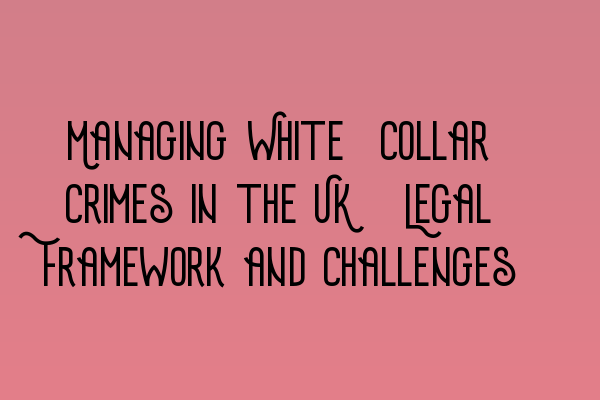Managing White-Collar Crimes in the UK: Legal Framework and Challenges
White-collar crimes are non-violent offenses typically committed by individuals or organizations in the business or professional sector. Examples include fraud, money laundering, bribery, and insider trading. As the legal landscape continues to evolve, it is important for businesses and legal professionals to understand the legal framework and challenges associated with managing white-collar crimes in the UK.
Legal Framework
The legal framework for handling white-collar crimes in the UK is primarily governed by statutes and regulatory bodies. The Fraud Act 2006, for example, outlines offenses related to fraud, while the Proceeds of Crime Act 2002 focuses on money laundering. Other relevant legislation includes the Bribery Act 2010 and the Insider Dealing Act 1993.
In addition to legislation, regulatory bodies such as the Serious Fraud Office (SFO) and the Financial Conduct Authority (FCA) play a crucial role in investigating and prosecuting white-collar crimes. These bodies have the power to initiate investigations, gather evidence, and bring cases to court.
Challenges
Managing white-collar crimes presents several challenges. Firstly, the complexity of financial transactions and business operations involved in such offenses can make identifying and proving criminal conduct difficult. This requires expert knowledge and investigative skills.
Secondly, the ever-evolving nature of technology poses challenges in detecting and preventing white-collar crimes. Cybercrime, for instance, has become a significant concern in recent years, requiring organizations to invest in robust cybersecurity measures.
Furthermore, the international dimension of many white-collar crimes adds complexity to investigations. Cooperation between different jurisdictions and navigating extradition processes can be time-consuming and challenging.
Lastly, the reputational damage caused by white-collar crimes can be severe for individuals and organizations alike. Rebuilding trust and mitigating reputational harm is often a long and arduous process.
Conclusion
Managing white-collar crimes in the UK requires a deep understanding of the legal framework and the challenges involved. Businesses and legal professionals must stay up-to-date with relevant legislation and collaborate with regulatory bodies to effectively combat these offenses.
If you are interested in learning more about the legal profession and preparing for the SQE exams, consider exploring our SQE 1 Practice Exam Questions or SQE 1 Practice Mocks FLK1 FLK2 to enhance your knowledge. We also offer comprehensive SQE 2 Preparation Courses and SQE 1 Preparation Courses to help you excel in your studies. Stay updated with the latest SRA SQE Exam Dates.
